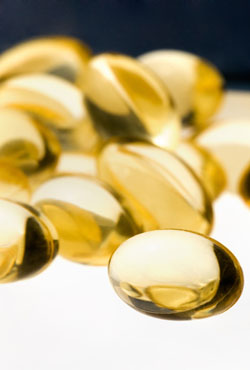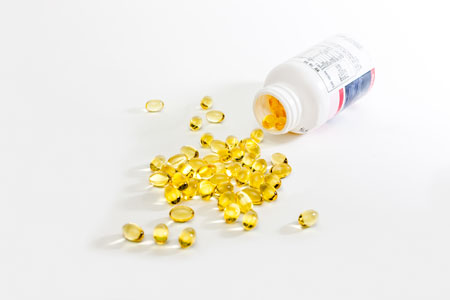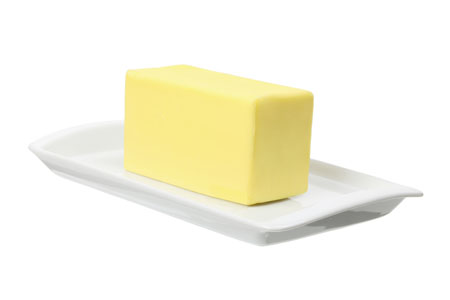The Addition of Fish Oil to Cognitive Behavioral Case Management is Not Effective for Youth Depression
In a relatively large placebo-controlled study adding a combination of 840 mg of eicosapentaenoic acid (EPA) and 560 mg of docosahexaenoic acid (DHA) versus placebo did not help treat depressed youth undergoing cognitive behavioral case management (CBCM) (Amminger et al, Biol. Psychiatry, June 22, 2023).
These findings add to the ongoing inconsistency of the effectiveness of Omega 3 Fatty Acids in treating depression. It had appeared more effective in younger than older depressed patients, but now even this trend appears unreliable.
A meta analysis does support use Omega 3 Fatty Acids for ADHD, however.
Meta-Analysis Finds Omega-3 Fatty Acids Do Not Reduce Cardiovascular Disease Risk
 In a 2018 meta-analysis published in the journal JAMA Cardiology, researcher Theingi Aung and colleagues found that across 10 studies including a total of 77,197 participants, omega-3 fatty acid supplementation did not reduce risk of coronary heart disease in people at high risk. This newer finding conflicts with a 2017 advisory from the American Heart Association that suggested omega-3 fatty acid supplementation might prevent cardiovascular disease.
In a 2018 meta-analysis published in the journal JAMA Cardiology, researcher Theingi Aung and colleagues found that across 10 studies including a total of 77,197 participants, omega-3 fatty acid supplementation did not reduce risk of coronary heart disease in people at high risk. This newer finding conflicts with a 2017 advisory from the American Heart Association that suggested omega-3 fatty acid supplementation might prevent cardiovascular disease.
When it comes to mood disorders, it has been similarly difficult to pin down whether omega-3 fatty acids are helpful. Data on omega-3 fatty acid supplements for the prevention of depression have been ambiguous, with small numbers of studies and variations in study design that make it difficult to draw strong conclusions about whether these supplements can improve or prevent depression.
A 2016 systematic review by Paola Bozzatello and colleagues in the Journal of Clinical Psychiatry found only seven studies of omega-3 fatty acid supplementation in bipolar disorder. The studies had small sample sizes and widely varying dosage parameters, so the evidence that can be drawn from them is not strong, but the review did find a modest benefit on bipolar depression (but not mania) when omega-3 fatty acids were added to a treatment regimen, compared to treatment as usual.
The same review found that studies of omega-3 fatty acid supplementation in unipolar depression also varied widely, and thus it was difficult to draw inferences from them. Some meta-analyses found no benefit to omega-3 fatty acid supplementation, while others suggested that omega-3s could improve depression. The review found that the type of omega-3 fatty acids used might matter. Supplementation with EPA seemed to improve depression more than supplementation with DHA. The review also cited a 2014 comprehensive meta-analysis by Giuseppe Grosso and colleagues in the journal PLoS One that analyzed the findings from 19 studies in people with depression or depressive symptoms. Grosso and colleagues found that people with more severe depression seemed to benefit more from omega-3s.
Certain ‘Nutraceuticals’ Aid Depression Treatment
A systematic review of research on the value of pharmaceutical-grade nutritional supplements, or ‘nutraceuticals,’ in depression treatment has found that several do indeed improve depression symptoms.
The 2016 review by Jerome Sarris and colleagues in the American Journal of Psychiatry found that the following nutraceuticals primarily produced positive results compared to placebo: omega-3 fatty acids (primarily EPA or ethyl-EPA); vitamin D; l-methylfolate (a more potent form of folic acid); and S-adenosyl methionine or SAMe, a beneficial compound created from toxic homocysteine with the help of folate.
Editor’s Note: Most of these compounds can also be useful in bipolar depression. Omega-3 fatty acids and vitamin D are helpful to many patients. L-methylfolate is particularly helpful to the 30% of the population with a MTHFR deficiency that interferes with the ability of folate to break down homocysteine. SAMe is an exception—while it is effective in unipolar depression, it may cause switching into mania in patients with bipolar disorder.
The researchers identified a few additional nutraceuticals that each had one study supporting their use—creatine, sometimes used by weightlifters to provide extra energy to muscles; folinic acid, which can protect bone marrow and other cells during chemotherapy; and a combination of amino acids.
Results from studies that compared other compounds to placebo were mixed. Those included studies of zinc, folic acid, vitamin C, and the amino acid tryptophan. A study of inositol, a compound found in plants that is not normally digestible, had nonsignificant results.
No serious side effects were observed in any of the studies of nutraceuticals, though some caused minor digestive disturbances.
Editor’s Note: Another beneficial nutraceutical that did not appear in the review article is N-acetylcysteine. In 6- to 8-week studies, NAC improved depression and anxiety compared to placebo. It also improved bipolar depression and reduced many habits and additions in non-bipolar patients. These include cocaine and gambling addition, alcohol and nicotine use, trichotillomania (compulsive hair-pulling) and obsessive compulsive disorder (OCD).
Omega-3 Fatty Acids Prevent Conversion to Psychosis
 A new long-term study of omega-3 polyunsaturated fatty acids for psychosis prevention shows that almost seven years after a 3-month stint of receiving these dietary supplements daily, adolescents and young adults at high risk for psychosis showed fewer symptoms of conversion to full-blown psychosis than those who received placebo during the same period.
A new long-term study of omega-3 polyunsaturated fatty acids for psychosis prevention shows that almost seven years after a 3-month stint of receiving these dietary supplements daily, adolescents and young adults at high risk for psychosis showed fewer symptoms of conversion to full-blown psychosis than those who received placebo during the same period.
The research team, led by Paul Amminger, originally found that among 81 youth (mean age 16.5) at high risk of developing psychosis due to their family histories, the 41 who received 12 weeks of daily supplementation with 700mg of eicosapentaenoic acid (EPA) omega-3s and 480 mg of docosahexaenoic acid (DHA) omega-3s showed reduced likelihood of conversion to psychosis one year later than the 40 who received placebo.
The team followed up an average of 6.7 years later with 71 of the original 81 participants. Among those who had received the omega-3 intervention, 9.8% had developed psychosis. Among the placebo group, 40% had developed psychosis, and they had done so earlier.
In addition, the omega-3 participants were better functioning, they had required less antipsychotic medication, and they had lower rates of any psychiatric disorder than the placebo group.
Amminger wrote in the journal Nature Communications, “Unlike antipsychotics, fish oil tablets have no side effects and arent’s stigmatizing to patients.”
Editor’s Note: Because of their lack of side effects, a good case can be made for omega-3 fatty acids for patients at high risk for psychosis. The novel thing about this study is that short-term treatment with omega-3 fatty acids had preventive effects almost 7 years later.
People with High Inflammation Respond Best to EPA Omega-3 Fatty Acids in Depression
Omega-3 fatty acids are found in some green vegetables, vegetable oils, and fatty fish. There is some evidence that omega-3 fatty acid supplements can reduce depression, but researchers are trying to clarify which omega-3s are most helpful, and for whom. A new study in Molecular Psychiatry suggests that depressed people with higher inflammation may respond best to EPA omega-3 fatty acids compared to DHA omega-3 fatty acids or placebo. Researchers led by M.H. Rapaport divided people with major depressive disorder into “high” and “low” inflammation groups based on their levels of the inflammatory markers IL-1ra, IL-6, high-sensitivity C-reactive protein, leptin, and adiponectin. Participants were randomized to receive eight weeks of treatment with EPA omega-3 supplements (1060mg/day), DHA omega-3 supplements (900mg/day), or placebo.
While overall treatment differences among the three groups as a whole were negligible, the high inflammation group improved more on EPA than on placebo or DHA, and more on placebo than on DHA. The authors suggest that EPA supplementation may help relieve symptoms of depression in people whose depression is associated with high inflammation levels, a link common among obese people with depression.
Editor’s Note: These data add to a study by Rudolph Uher et al. in which people with high levels of C-reactive protein responded better to the tricyclic antidepressant nortriptylene, while those with low levels of the inflammatory marker responded better to the selective serotonin reuptake inhibitor antidepressant escitalopram.
Omega-3 Fatty Acids Improve Attention in Boys
A new study finds that omega-3 fatty acid supplementation improves attention in boys both with and without attention deficit hyperactivity disorder (ADHD). The study by Dienke J. Bos and colleagues in the journal Neuropsychopharmacology included 40 boys (aged 8–14) with ADHD and 39 demographically matched controls. Participants were given 10 g per day of margarine supplemented with either omega-3 fatty acids (eicosapentaenoic acid (EPA) and docosahexaenoic acid (DHA)) or placebo.
The children who received EPA/DHA supplementation showed improvements in attention (as rated by parents) compared to those who received placebo. Improvement was greater in the children with ADHD. Supplementation did not affect cognitive control or brain activity on functional magnetic resonance imaging (fMRI). Those boys who received omega-3s showed higher DHA levels on followup.




